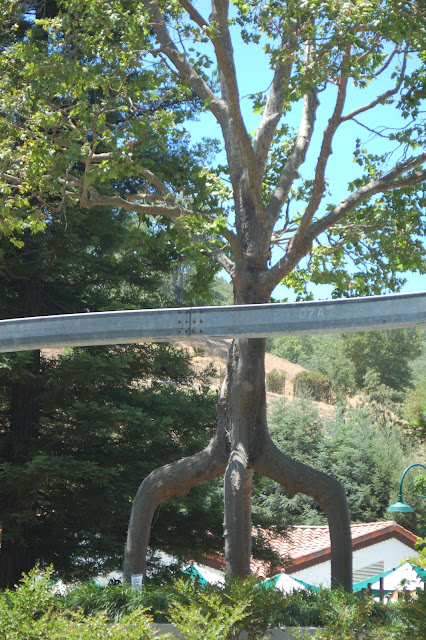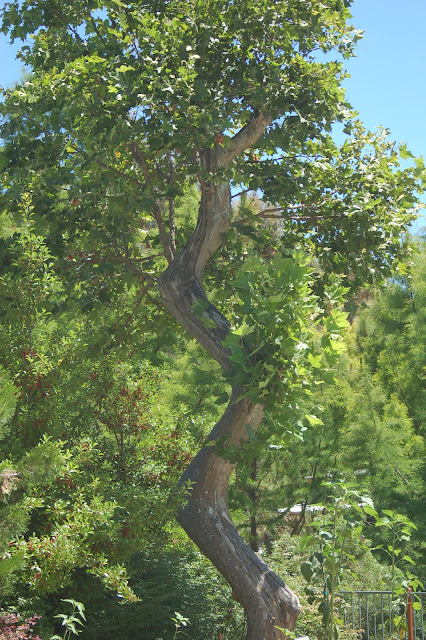Cover crops. I had never heard the term before my husband became a
farmer, but it's something you grow not for the harvest you will reap but for the improvement of the soil. Farmers interested in sustainability consider this the backbone of any annual cropping system. There are "legume cover crops"
like clover, alfalfa, or soybean and these serve to fix atmospheric
nitrogen into a form that plants and microorganisms can use.
| We have clover in one bed. This one has flowered. Pretty isn't it? |
| This is oats. Looks like grass :) |
Most harvest-able crops are grown from March to possibly November so this is what farmers should do with their fields from December
till February. According to an article by Ohio State University, cover crops 1) improve the quality of the soil, 2) reduce erosion from wind and rain, 3) improve fertility (by balancing the nitrogen levels and reducing the leaching of other nutrients), 4) suppress weeds and 5) control insects by encouraging beneficial ones.
So why do I bring this up? Well, as I've been going back and forth, and back and forth to our little tank to fill up my watering can, at first I couldn't help but think, "This is lame. We aren't even going to be able to eat any of this stuff. This is a lot of work for something that's just going to be forked back into the soil!" Then I heard a sermon at church that really got me thinking.
He started out by sharing an article that talked about how the worst place to be when you are sick is a hospital. Hospitals cause 100,000 preventable deaths each year. Why? Dumb stuff like a surgeon nicking a healthy blood vessel; a nurse mistakenly administering
a toxic dose of medicine or the staff failing to adequately disinfect a
room. Read the statistics on these pictures - it's crazy!
the truth still stands "to err is human")
So what should be done about that? For one, many hospitals have started using simple checklists. But if our educational system would incorporate the counsel in the following quote, when they became professionals, many lives would be saved.
The benefit of manual training is needed also by professional men. A man may have a brilliant mind; he may be quick to catch ideas; his knowledge and skill may secure for him admission to his chosen calling; yet he may still be far from possessing a fitness for its duties. An education derived chiefly from books leads to superficial thinking. Practical work encourages close observation and independent thought. Rightly performed, it tends to develop that practical wisdom which we call common sense. It develops ability to plan and execute, strengthens courage and perseverance, and calls for the exercise of tact and skill. {Education 220}
Partner that quote with the next two thoughts:
Now, as in the days of Israel, every youth should be instructed in the duties of practical life. Each should acquire a knowledge of some branch of manual labor by which, if need be, he may obtain a livelihood. This is essential, not only as a safeguard against the vicissitudes of life, but from its bearing upon physical, mental, and moral development. Even if it were certain that one would never need to resort to manual labor for support, still he should be taught to work. Without physical exercise no one can have a sound constitution and vigorous health; and the discipline of well-regulated labor is no less essential to the securing of a strong, active mind and a noble character. {Counsel to Teachers, 307}
When we found out our well water was toxic to our soil we started doing the research on what we should do. There's only a couple of options. 1) Spend tons of money to get our will drilled deeper and still not be guaranteed that there would be purer water. 2) Install a rain catching system (put gutters around the garage and house which directs rain water into a huge tank which then gets pumped underground to our garden) Still pretty pricey. 3) Quit gardening. We are probably going to do #2.
Although right now my kids are enthralled with dirt and tractors, when they grow up they may never become farmers. And they may never have their own personal garden when they become adults. So why are we spending so much time and money investing in it? Because gardening is valuable for their physical health, it's valuable for their mental development and it's really great for their character development. I liken it to a cover crop for the soil of their heart. It's one of those non-urgent but important things that will help them reap higher and better yields later on.
We know a kid who is only 7 and is already learning two foreign languages, can play very well on the piano, and reads on a 5th grade level. It looks pretty impressive. Sometimes I ask myself if I'm short-changing my kid's from reaching their full potential academically by spending more time outside working.
If the youth can have but a one-sided education, which is of the greater consequence--a knowledge of the sciences, with all the disadvantages to health and life, or a knowledge of labor for practical life? We unhesitatingly answer, The latter. If one must be neglected, let it be the study of books. {Child Guidance, 358}










